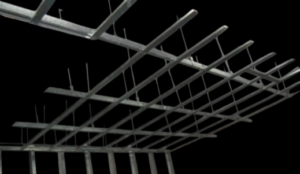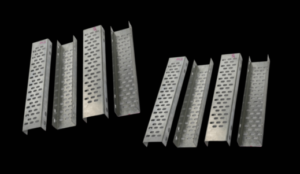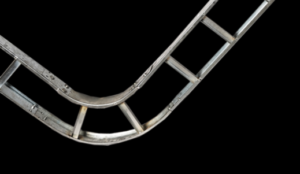The manufacturing world has entered a new era. Smart factories, driven by automation, data integration, robotics, and sensor-based decision-making, are redefining industrial efficiency. But behind the intelligent machines, automated conveyors, and robotics platforms lies a crucial element that often goes unnoticed — the cable management system.
Cable trays form the structural and functional backbone of electrical connectivity in smart factories. They ensure clean routing, protection, accessibility, and organization of power and communication cables that run throughout the facility.
At Aparna Rollform, cable tray systems are engineered to support evolving Industry 4.0 environments — delivering reliable performance, corrosion resistance, and long-term safety. In modern plants, cable trays are no longer just accessories; they are strategic infrastructure.
Why Cable Management Matters in Industry
Smart factories rely on interconnected machinery, sensors, PLCs (Programmable Logic Controllers), automated robots, and large-scale data systems. Every device needs power and continuous communication. Poorly managed cables lead to:
- Signal loss or interference
- Electrical faults and fire risks
- Downtime and expensive maintenance
- Reduced efficiency of automation systems
Cable trays help prevent these issues by providing a structured, safe, and accessible cable pathway across the facility.
How Cable Trays Support Smart Factory Efficiency
1. Organized Routing for Complex Cable Networks
Automated plants require layered connectivity — power cables, control cables, network data cables, and sometimes fiber optics. Cable trays ensure:
- Clear segregation
- Reduced electromagnetic interference
- Easy identification and maintenance
This organization reduces troubleshooting time and prevents operational delays.
2. Enhanced Safety and Fire Protection
Loose or tangled cables can generate heat, friction, and sometimes sparks. Well-structured cable trays:
- Promote airflow and heat dissipation
- Prevent cable wear and surface damage
- Reduce the risk of electrical fire
Aparna Rollform’s metal cable trays are designed for high load-bearing capacity and industrial-grade safety compliance, ensuring reliability in harsh plant environments.
3. Scalability for Expanding Automation Needs
Smart factories evolve. New machines get added, systems get upgraded, and new production lines are integrated. Cable trays must adapt without major infrastructure changes.
With modular layouts, Aparna Rollform cable trays support:
- Quick expansion
- Layout adjustments
- Additional cable loads
This ensures long-term flexibility and lower modification costs.
4. Compatibility with IoT and High-Speed Networks
Smart factories rely heavily on data transmission. Real-time communication between equipment is essential for automation efficiency. Shielded routing options in cable trays help:
- Reduce signal interference
- Maintain network stability
- Improve sensor responsiveness
In automated plants, seconds matter — stable data transmission sustains productivity.
5. Durability for Industrial Conditions
Factories often involve:
- High temperatures
- Moisture and humidity
- Chemical fumes
- Mechanical vibration
- Outdoor and rooftop exposure
Aparna Rollform cable trays are available in:
- Hot-Dip Galvanized Finish
- Pre-Galvanized Coating
- Powder-Coated Surface
- Stainless Steel Build Options
These finishes ensure long-lasting performance even in corrosive and heavy-duty environments.
Types of Cable Trays Used in Smart Industrial Plants
While there are multiple cable tray formats, the most common designs include:
- Ladder Type Cable Trays: For heavy power cable loads and ventilation
- Perforated Cable Trays: For moderate loads and structured routing
- Raceways and Trunking Systems: For enclosed, dust-protected pathways
- Accessories (Elbows, Tees, Reducers): To support flexible layouts
Aparna Rollform offers all these with customizable dimensions based on plant design requirements.
Maintenance & Accessibility Advantages
Smart plants need quick problem resolution to prevent costly downtime. Cable trays allow technicians to:
- Inspect cables easily
- Replace or reroute cabling quickly
- Avoid damaging surrounding equipment
Compared to buried conduits or closed ducting systems, cable trays save time, reduce risk, and lower cost.
Why Choose Aparna Rollform Cable Tray Systems?
- Engineered to meet industrial load and performance standards
- Manufactured with precision roll-forming technology
- Customizable sizes, thickness, and finishes
- Corrosion-resistant and long operational lifespan
- Designed for both new installations and expansion projects
Aparna Rollform ensures every cable tray system is aligned with the safety, efficiency, and scalability needs of modern industrial environments.
Conclusion
Smart factories and automated plants depend on reliable electrical and communication networks. Cable trays provide the organizational backbone that keeps these systems functioning efficiently, safely, and without interruption. As industries continue adopting automation and digital integration, well-engineered cable tray systems become even more important.
With high-performance materials, scalable designs, and industry-focused engineering, Aparna Rollform delivers cable tray solutions built for the future of manufacturing.




